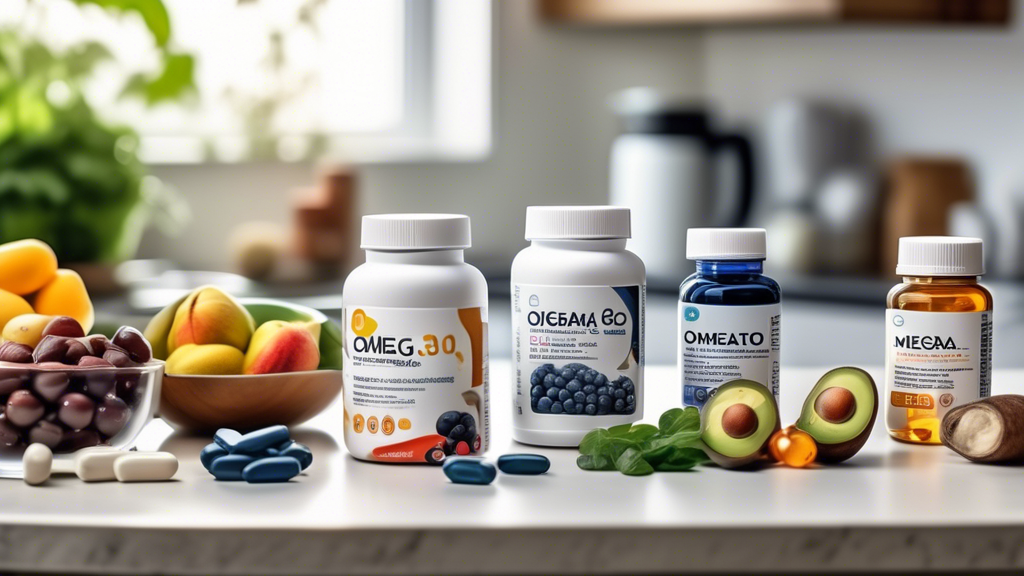Top Supplements for Cardiovascular Health
Key Takeaway
Ensuring cardiovascular health is crucial for long-term well-being. This article delves into the top supplements that have demonstrated efficacy in supporting heart health, including Omega-3 fatty acids, Coenzyme Q10, fiber supplements, magnesium, and more.
Introduction
The cardiovascular system, comprising the heart and blood vessels, is the cornerstone of the body’s overall health. Cardiovascular diseases (CVD) are the leading cause of mortality globally, often attributed to factors like poor diet, lack of exercise, and genetic predisposition. While lifestyle modifications are fundamental in maintaining heart health, supplements can offer additional support. This article explores the top supplements that can bolster cardiovascular health and the science behind their efficacy.
Omega-3 Fatty Acids
What are Omega-3 Fatty Acids?
Omega-3 fatty acids are essential fats that the body cannot produce on its own. They play a vital role in cell membrane structure and function, reducing inflammation, and supporting overall heart health.
Sources of Omega-3 Fatty Acids
- Fish oil supplements
- Flaxseed oil
- Algal oil (for vegetarians and vegans)
Benefits for Cardiovascular Health
Numerous studies have highlighted the cardiovascular benefits of Omega-3 fatty acids. Key advantages include:
- Reducing Triglycerides: High levels of triglycerides are a significant risk factor for heart disease. Omega-3s help lower these levels.
- Lowering Blood Pressure: Regular intake can help reduce hypertension, a major risk factor for cardiovascular diseases.
- Preventing Blood Clots: Omega-3s make platelets less sticky, reducing the chances of clots that can lead to heart attacks and strokes.
Coenzyme Q10 (CoQ10)
What is CoQ10?
Coenzyme Q10 is a naturally occurring antioxidant in the body that plays a crucial role in energy production within cells. It also protects cells from oxidative damage.
Sources of CoQ10
- Meat, particularly organ meats like liver
- Fish
- Whole grains
- Supplements
Benefits for Cardiovascular Health
CoQ10 is especially beneficial for cardiovascular health for several reasons:
- Energy Production: It helps produce ATP, the primary energy carrier in cells, particularly important for heart muscle function.
- Antioxidant Properties: It neutralizes free radicals, reducing oxidative stress and preventing cellular damage.
- Improving Symptoms of Heart Failure: Some studies suggest that CoQ10 can improve symptoms and reduce adverse events in heart failure patients.
Fiber Supplements
The Role of Fiber
Dietary fiber is essential for digestive health and has significant benefits for cardiovascular health. It is found in fruits, vegetables, whole grains, and legumes.
Types of Fiber
- Soluble Fiber: Dissolves in water to form a gel-like substance that can lower blood cholesterol and glucose levels. Examples include oats, barley, and psyllium.
- Insoluble Fiber: Helps with bowel movements and prevents constipation. Examples include whole grains and vegetables.
Benefits for Cardiovascular Health
Fiber supplements, particularly those rich in soluble fiber, offer several cardiovascular benefits:
- Lowering Cholesterol Levels: Soluble fiber can reduce levels of low-density lipoprotein (LDL) cholesterol, which is known to contribute to heart disease.
- Regulating Blood Sugar Levels: Helps stabilize blood glucose levels, reducing the risk of type 2 diabetes, a known risk factor for heart disease.
- Weight Management: High-fiber diets can help with weight loss, reducing the risk of obesity, another risk factor for cardiovascular disease.
Magnesium
What is Magnesium?
Magnesium is a vital mineral involved in over 300 biochemical reactions in the body, including those crucial for cardiovascular health.
Sources of Magnesium
- Leafy green vegetables
- Nuts and seeds
- Whole grains
- Supplements
Benefits for Cardiovascular Health
Magnesium supplements have several heart-healthy benefits:
- Regulating Blood Pressure: It helps relax blood vessels, thereby reducing hypertension.
- Enhancing Heart Function: Magnesium is critical for normal muscle and nerve function, including the heart muscle.
- Reducing Inflammation: It helps lower markers of inflammation, which are linked to a higher risk of heart disease.
Garlic Extract
What is Garlic Extract?
Garlic has been used for centuries for its medicinal properties. Garlic extract, concentrated in supplement form, provides numerous health benefits, including for the cardiovascular system.
Sources of Garlic
- Fresh garlic cloves
- Garlic extract supplements
Benefits for Cardiovascular Health
Several studies suggest that garlic extract can improve heart health by:
- Lowering Blood Pressure: It can help reduce systolic and diastolic blood pressure.
- Reducing Cholesterol Levels: It may lower levels of total and LDL cholesterol.
- Antioxidant Properties: Garlic contains antioxidants that can protect against cell damage and aging, which are risk factors for heart disease.
Vitamin D
What is Vitamin D?
Vitamin D, often called the sunshine vitamin, is essential for maintaining the health of bones and the immune system. Recent research has also shown its importance in cardiovascular health.
Sources of Vitamin D
- Sunlight exposure
- Fatty fish like salmon and tuna
- Fortified foods such as milk and cereals
- Supplements
Benefits for Cardiovascular Health
Vitamin D supports heart health by:
- Regulating Blood Pressure: It can help lower blood pressure levels, reducing the risk of heart disease.
- Reducing Inflammation: Reduces chronic inflammation, which is a contributing factor to heart disease.
- Improving Heart Muscle Function: Supports the contractility and function of the heart muscle.
Red Yeast Rice
What is Red Yeast Rice?
Red yeast rice is a traditional Chinese medicinal product made by fermenting rice with a specific type of yeast. It contains compounds similar to statins, which are drugs prescribed to lower cholesterol.
Sources of Red Yeast Rice
- Whole red yeast rice
- Red yeast rice supplements
Benefits for Cardiovascular Health
Red yeast rice is effective in improving heart health by:
- Lowering LDL Cholesterol: It can significantly reduce levels of bad cholesterol.
- Improving Blood Lipid Profiles: May improve overall lipid profiles, reducing the risk of heart disease.
Conclusion
Maintaining cardiovascular health is multifaceted, involving lifestyle changes, dietary adjustments, and sometimes, supplementation. Supplements like Omega-3 fatty acids, Coenzyme Q10, fiber supplements, magnesium, garlic extract, Vitamin D, and red yeast rice offer substantial benefits for heart health. Always consult with a healthcare provider before starting any supplement regimen, as individual needs and responses can vary.

